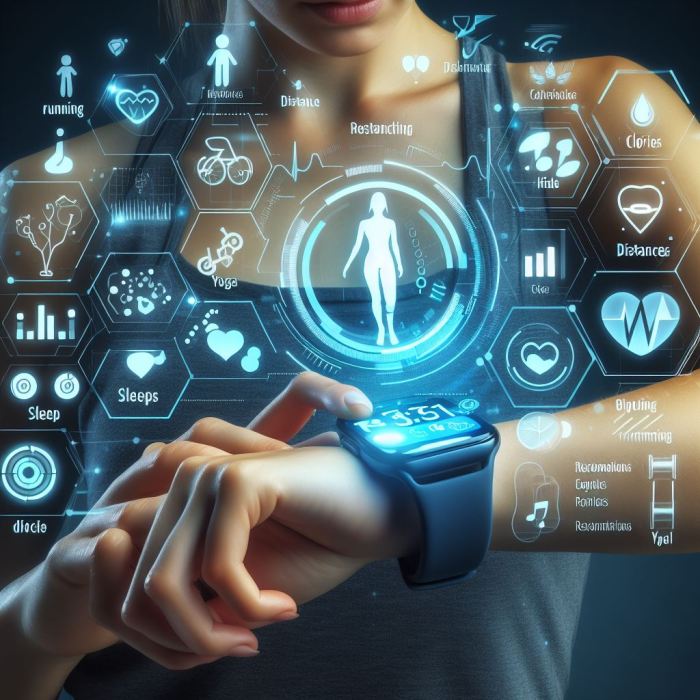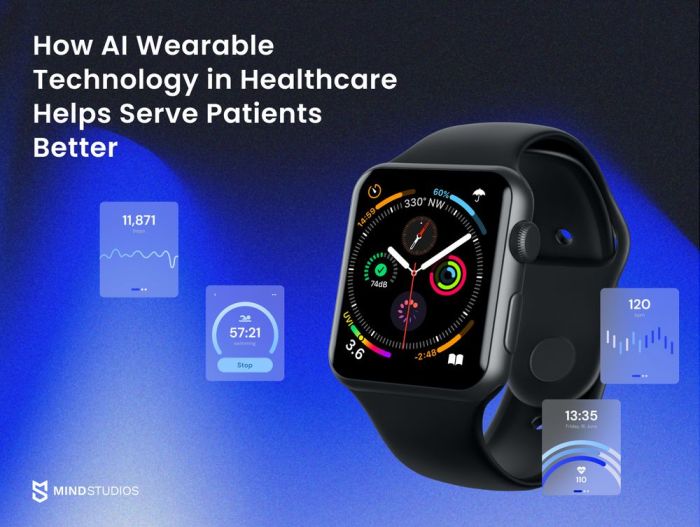Smart health gadgets with AI tracking are revolutionizing personal wellness. These devices, ranging from smartwatches monitoring heart rate to sophisticated apps analyzing sleep patterns, offer unprecedented insights into our physical and mental well-being. The integration of artificial intelligence allows for personalized health recommendations, early detection of potential problems, and proactive management of chronic conditions, ultimately empowering individuals to take control of their health journey.
This exploration delves into the capabilities, benefits, and considerations surrounding this rapidly evolving technology.
The accuracy and reliability of AI-driven health data are paramount. Factors such as sensor quality, data interpretation algorithms, and user compliance significantly impact the effectiveness of these gadgets. Furthermore, ethical concerns regarding data privacy and the potential for bias in algorithms require careful consideration. Balancing the benefits of personalized health monitoring with the responsible use of personal data is crucial for the future of this technology.
The convergence of smart technology and artificial intelligence (AI) has revolutionized the healthcare landscape, giving rise to a new generation of smart health gadgets capable of sophisticated health tracking and personalized insights. These devices, ranging from smartwatches and fitness trackers to advanced biosensors and connected scales, leverage AI algorithms to analyze vast amounts of data, providing users with actionable information to improve their well-being.
This detailed guide explores the world of AI-powered smart health gadgets, examining their functionalities, benefits, limitations, and the future of this rapidly evolving field.
Understanding AI in Health Tracking: Smart Health Gadgets With AI Tracking
AI plays a crucial role in enhancing the capabilities of smart health gadgets. Traditional fitness trackers primarily collect data points like steps taken, calories burned, and sleep patterns. AI-powered devices go beyond simple data collection; they analyze this data to identify trends, predict potential health risks, and offer personalized recommendations. This involves sophisticated machine learning algorithms that learn from individual user data and large datasets to provide increasingly accurate and relevant insights.
Key AI Applications in Smart Health Gadgets:
- Activity Recognition: AI algorithms accurately identify different types of physical activity, providing more precise calorie expenditure estimations and workout summaries.
- Sleep Stage Analysis: Advanced sleep tracking goes beyond simply measuring sleep duration. AI analyzes sleep stages (light, deep, REM) to identify sleep disturbances and suggest improvements to sleep hygiene.
- Heart Rate Variability (HRV) Monitoring: AI can analyze HRV data to assess stress levels, detect early signs of illness, and provide personalized stress management recommendations.
- Anomaly Detection: AI algorithms can detect unusual patterns in physiological data, potentially indicating health issues that require medical attention. This could include irregular heart rhythms or sudden changes in sleep patterns.
- Personalized Recommendations: Based on individual data and established health guidelines, AI provides tailored recommendations for diet, exercise, and overall lifestyle improvements.
- Predictive Analytics: In the future, AI may be able to predict potential health risks based on individual data and identify potential health problems before they manifest physically.
Types of AI-Powered Smart Health Gadgets
The market offers a wide array of smart health gadgets leveraging AI for health tracking. Here are some prominent examples:
Smartwatches and Fitness Trackers:
These ubiquitous devices are at the forefront of AI-powered health tracking. They monitor various health metrics, including heart rate, activity levels, sleep patterns, and sometimes even blood oxygen saturation. Advanced models utilize AI to analyze this data, providing personalized insights and recommendations.
Smart Scales:, Smart health gadgets with AI tracking
Beyond simply measuring weight, smart scales utilize AI to analyze body composition, providing detailed breakdowns of fat mass, muscle mass, and water weight. This data can be crucial for individuals tracking their fitness progress or managing specific health conditions.
Connected Blood Pressure Monitors:
These devices track blood pressure readings and transmit the data to a smartphone app. AI algorithms can analyze trends over time, identify potential hypertension risks, and even alert users to concerning readings.
Continuous Glucose Monitors (CGMs):
For individuals with diabetes, CGMs provide continuous glucose readings, eliminating the need for frequent finger-prick tests. AI algorithms can predict glucose levels, helping users manage their diabetes more effectively.
Advanced Biosensors:
These sophisticated devices can track a wide range of physiological parameters, including ECG, EEG, and other vital signs. AI algorithms analyze this data to provide detailed insights into overall health and well-being.

Benefits of Using AI-Powered Smart Health Gadgets
The benefits of integrating AI into health tracking are substantial:
- Improved Health Awareness: Continuous monitoring provides a detailed picture of your health, allowing you to identify potential issues early on.
- Personalized Insights: AI algorithms tailor recommendations to your individual needs and goals, maximizing the effectiveness of health interventions.
- Proactive Health Management: By detecting anomalies and predicting potential risks, AI helps individuals take proactive steps to maintain their health.
- Enhanced Motivation and Engagement: The personalized feedback and progress tracking features of these devices can significantly enhance motivation and adherence to health goals.
- Early Disease Detection: AI algorithms can identify subtle patterns that may indicate early signs of disease, potentially leading to earlier diagnosis and treatment.
- Improved Healthcare Efficiency: By providing valuable data to healthcare professionals, these devices can improve the efficiency and effectiveness of healthcare delivery.
Limitations and Considerations
Despite their many benefits, AI-powered smart health gadgets have limitations:
- Data Accuracy: The accuracy of the data collected depends on various factors, including the quality of the sensors and the user’s adherence to proper usage instructions.
- Data Privacy and Security: The collection and storage of personal health data raise concerns about privacy and security. It’s crucial to choose reputable companies with robust data protection measures.
- Algorithm Bias: AI algorithms are trained on data, and if that data is biased, the resulting insights may be inaccurate or unfair.
- Over-Reliance on Technology: It’s important to remember that these devices are tools to support healthy lifestyles, not replacements for professional medical advice.
- Cost: Some advanced AI-powered health gadgets can be expensive, making them inaccessible to some individuals.
The Future of AI in Smart Health Gadgets
The field of AI-powered smart health gadgets is rapidly evolving. Future developments may include:
- More accurate and sophisticated algorithms: Continued advancements in machine learning will lead to more accurate and personalized health insights.
- Integration with other healthcare technologies: Smart health gadgets will be increasingly integrated with electronic health records (EHRs) and other healthcare systems.
- Expansion of health metrics tracked: Future devices may track a wider range of physiological parameters, providing a more comprehensive picture of health.
- Improved user interfaces and experiences: The user experience will be further enhanced with more intuitive interfaces and personalized feedback.
- Increased accessibility and affordability: Technological advancements will likely lead to more affordable and accessible AI-powered health gadgets.
Frequently Asked Questions (FAQ)
- Q: Are AI-powered health gadgets accurate? A: The accuracy varies depending on the device and the specific metric being tracked. While generally reliable, it’s important to remember that these are tools, not replacements for professional medical advice.
- Q: Are my data safe and private? A: Reputable companies prioritize data security and privacy. However, it’s crucial to review a company’s privacy policy before using their products.
- Q: How much do these gadgets cost? A: Prices vary widely depending on the features and capabilities of the device. Some basic fitness trackers are affordable, while advanced biosensors can be quite expensive.
- Q: Can these gadgets diagnose medical conditions? A: No, these gadgets are not intended to diagnose medical conditions. They provide data that can be helpful in identifying potential health issues, but a professional medical diagnosis is always necessary.
- Q: How do I choose the right AI-powered health gadget? A: Consider your individual health goals, budget, and the specific metrics you want to track. Read reviews and compare features before making a purchase.
References
[Insert links to reputable sources such as research papers, articles from medical journals, and websites of leading health technology companies. Examples could include the NIH, Mayo Clinic, and publications from reputable tech companies involved in AI-powered health gadgets.]
Call to Action
Ready to take control of your health and wellness? Explore the world of AI-powered smart health gadgets and discover how these innovative technologies can help you achieve your health goals. Start your search today and find the perfect device to support your journey towards a healthier and happier life!
Q&A
What data do these gadgets typically collect?

Data collected varies depending on the device, but commonly includes heart rate, sleep patterns, activity levels, steps taken, calories burned, and sometimes even stress levels and blood oxygen saturation.
Are these gadgets accurate?
Accuracy varies; some are more precise than others. Calibration and individual factors can influence readings. It’s best to consult a healthcare professional for diagnosis rather than relying solely on gadget data.
How secure is my data?
Data security is a major concern. Choose reputable brands with strong privacy policies and robust security measures. Review privacy settings and understand how your data is used and protected.
